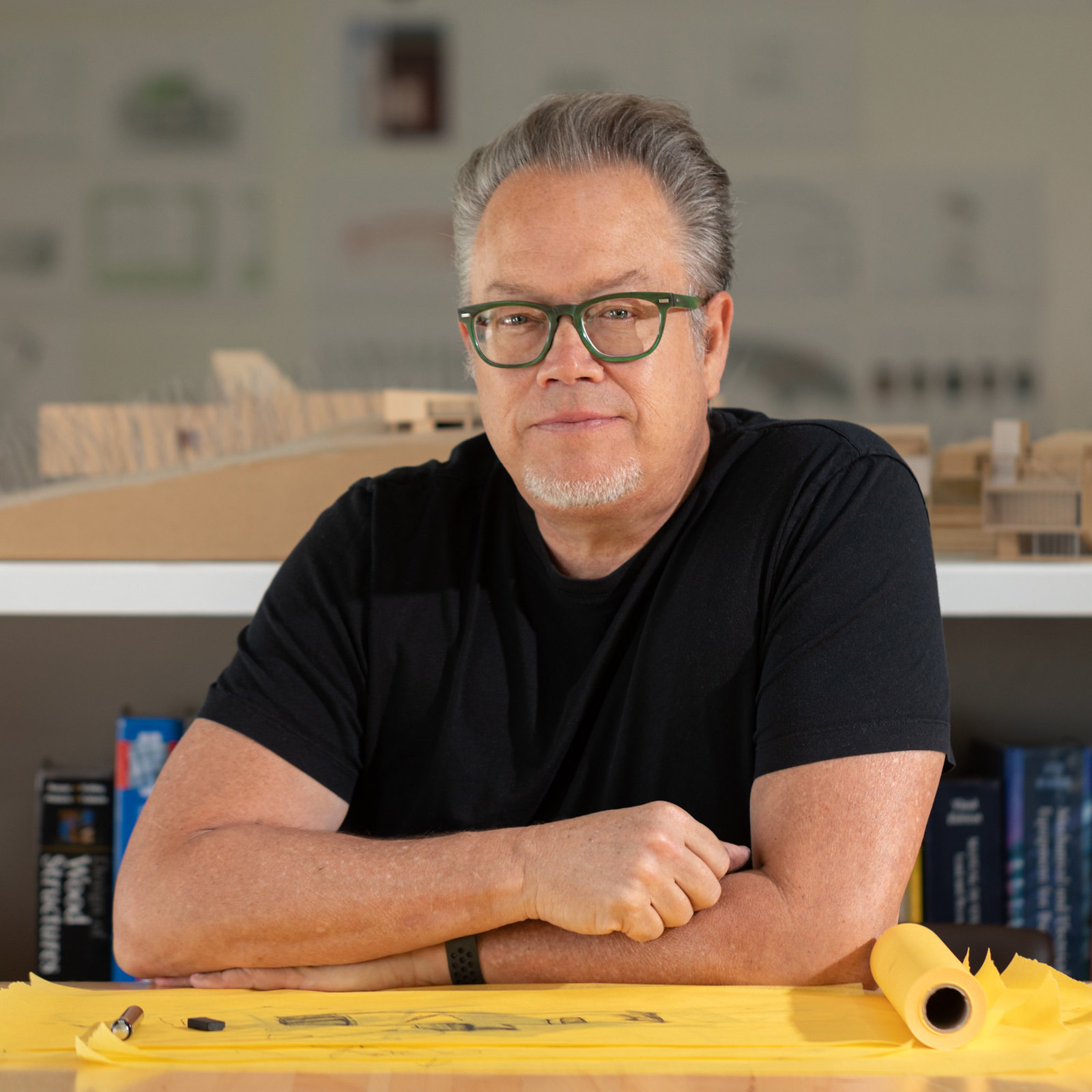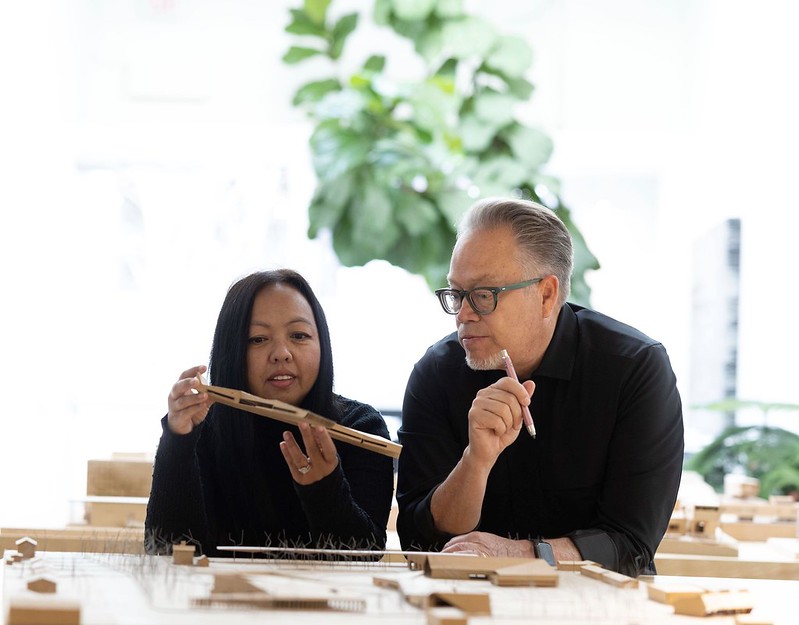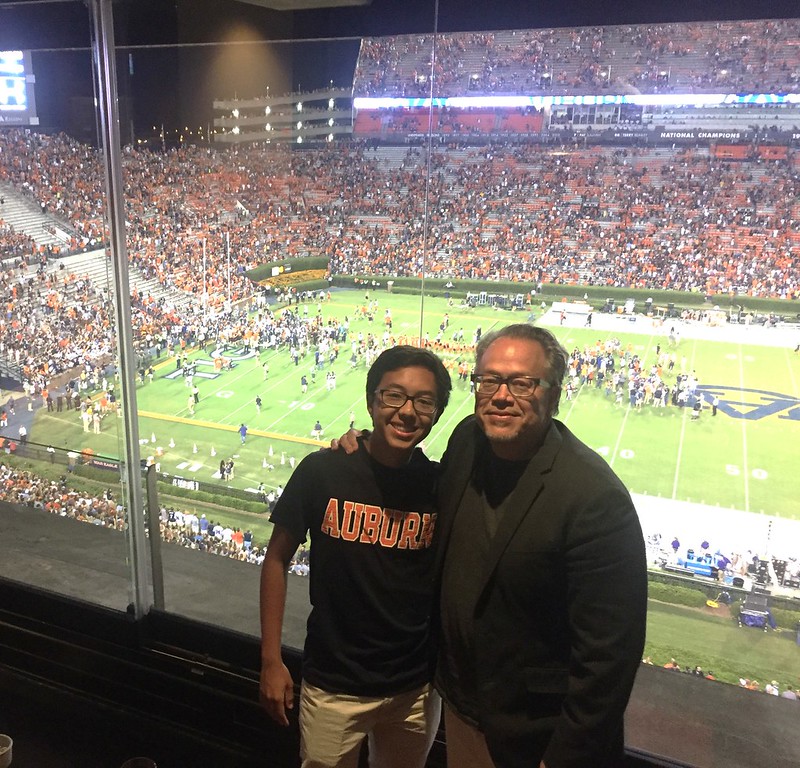content body

Auburn alumnus Marlon Blackwell and his firm, Marlon Blackwell Architects, have been selected to design the Global War on Terrorism Memorial in Washington, D.C. (Photo by Mark Jackson)
Marlon Blackwell has found the project of a lifetime.
The 1980 Auburn University architecture graduate and his 25-member design firm, Marlon Blackwell Architects, were selected from a pool of 177 candidates to create, shape and construct the Global War on Terrorism Memorial on the National Mall in Washington, D.C. The Global War on Terrorism Memorial Foundation (GWOTMF) bestowed the high honor upon Blackwell and his colleagues, who have embarked on a multi-year journey that carries an expected completion date of 2027.
Blackwell, who was born on Fürstenfeldbrook Air Base in Germany, was humbled to learn his firm was chosen from among a highly prestigious group of designers. He is energized by the project.
“It’s very exciting, and it’s very daunting,” Blackwell said. “It’s quite an honor to be selected for this project, and I think if we go through this process in a thoughtful and diligent way, it will yield very positive results.”
The memorial will be near the Lincoln Memorial, the Vietnam Veterans Memorial and National Desert Shield and Desert Storm Memorial. It will be located close to 23rd Street, Constitution Avenue and Henry Bacon Drive in the nation’s capital.
“It’s an amazing site,” Blackwell said. “It may be the last site to be developed on the National Mall. It’s very prominent and is not forested, which creates an even more interesting relationship with the Lincoln Memorial. The proximity to the other memorials will show how they could have connectivity among them, and there are a lot of possibilities there.”
When first asked to be a candidate for the project, Blackwell said his first instinct was to take a pass.
“Initially, I didn’t want to be involved,” he said. “We’d never done anything like that, and it’s a lot to wrap your head around. Growing up in a military family, I just wasn’t sure.”
Blackwell was encouraged by his partner of 20 years, Ati Blackwell, who completed and submitted the designer application. After being named finalists, the Blackwells presented to the GWOTMF and were selected for the $110 million project.
“Once they came back and said we were in the final five, I was like, ‘Oh my God! We’ve got to do this!’” he said.

Marlon and his partner of more than 20 years, Ati, have built Marlon Blackwell Architects into an extremely accomplished design house that has earned more than 160 national design awards. (Photo by Mark Jackson)
Passion project
The memorial resonates as a personal project for Blackwell, the son of U.S. Air Force MSgt. William Earl Blackwell, who served in the Vietnam War. His brother also served in the U.S. Army on the front lines of the Gulf War in Desert Storm, and his stepbrother was in the Air Force National Guard, serving in Afghanistan and Iraq. Additionally, Blackwell’s great uncle served in the U.S. Navy and was killed in action in World War II.
“It felt close to home, coming from a long line of military folks,” he said. “We now have an all-volunteer military, and a lot of people sacrifice their lives in this conflict — both military and civilians. Others returned home and remain impacted, along with their families.
“The bottom line is: How do you honor these people for their service in protecting our rights, freedoms and values as a country? Also, I think memorials — as the Vietnam War Memorial has proven — act as a way of healing, not only for individuals and families, but for healing as a nation.”
Blackwell recalls a conversation with his father before his passing in 2004 that will motivate his work on the memorial project.
“We were talking about politics and elections, and he revealed to me that he had never voted in a presidential election,” Blackwell said. “I was like, ‘Wow!’ and I said, ‘How could you not do that?’ He said, ‘Well, I’m a military man, and it doesn’t matter whether I like the president and doesn’t matter whether I agree with the party in office. I served my country, and I served the mission I was assigned.’
“That always stuck with me.”
He’s happy to be working with the foundation and Design Advisory Council and feels their partnership can lead to a one-of-a-kind creation.
“The people we’re working with in the Foundation are genuine and focused, and the project is apolitical, which is important,” Blackwell said. “The Foundation has already gone through all the governmental layers and secured a site, and that’s one thing I liked about the memorial. We have great partners in the Foundation.”

Marlon Blackwell, a 1980 Auburn University graduate, enjoys attending football games with his son, Zain.
Lengthy, meticulous process
Blackwell and his associates have embarked on a long process that will begin with information gathering expeditions at some of the nation’s other top memorials, including the 9/11 Memorial in New York City. Working in tandem with the GWOTMF and its Design Advisory Council — which consists of Gold Star family members, as well as veterans and other stakeholders — Blackwell and his team will be interviewing and consulting numerous constituents to catalog their insight and perspectives.
The project — fully funded by private donations — will take Marlon Blackwell Architects on a journey unlike any other for the Fayetteville, Arkansas, firm.
“It’s a great experiment to try and do this in such a way where you haven’t selected the design first, but instead choose a design team and together you work through it,” said Blackwell, whose firm has won more than 160 national design awards since its 1992 creation. “The design approach is more of a bottom-up process, which I appreciate.”
Construction is expected to take between 18-24 months, and Blackwell knows his firm faces a daunting task that includes a mix of opportunity, responsibility and pressure.
“We’ve never done anything like this, but there’s a great opportunity here,” he said. “We’re coming into this with an open mind and a lot of trust, and everybody is aligned with the mission. The mission is greater than any one person, and that’s the most important thing.”
His aim, Blackwell said, is to find patterns from other memorials and similar projects and data from the interviews, then use that insight to craft a design by curating and synthesizing site forces to create a place of reflection and remembrance.
“We’ll find the patterns that connect, and it will come through,” Blackwell said. “We’re making a place, and this place is for people, for families, for folks from all walks of life to be able to come and pay respect and honor those who have sacrificed. I think architecture has a way of creating an atmosphere of hope, and by getting us to reflect and turn inward and start to think outside our everyday lives. This is key to our mission.
“One of our goals would be to get this to point toward peace, because it’s difficult when you have an unresolved conflict or war that is ongoing. That would be the ultimate goal.”

Marlon and Ati Blackwell make their way to the Plains as often as possible from their home in Fayetteville, Arkansas.
Auburn experience laid foundation
Blackwell — who serves as the E. Fay Jones Distinguished Professor at the Fay Jones School of Architecture + Design at the University of Arkansas — credits his time at Auburn for providing the structure and framework he needed as a young man. He feels the instruction he received in the College of Architecture, Design and Construction laid a solid foundation for building a successful career.
“I learned so much along the way from my instructors,” said Blackwell, who taught at Auburn in 2009 as part of the Paul Rudolph Visiting Professorship. “They really challenged me to challenge myself, which was probably the best thing they could’ve done. There was some tough love there, too, but my professors helped me build a foundation that I could always draw upon. It was really about trying to find purpose and meaning in every project that you do.”
Blackwell knew about Auburn partly because his mother, Othella, and her side of the family hailed from Helena, Alabama. His maternal grandmother owned a flower shop in Alabaster, Alabama, where he would spend summers as a child, and his paternal grandmother taught at the University of Alabama at Birmingham and hosted a popular radio show in Birmingham, Alabama.
Another great uncle of Blackwell’s was an Auburn engineering graduate, further putting the Alabama-based, land-grant institution on his radar screen. Ironically, Auburn was suggested to Blackwell while attending a University of Florida career day as a high school senior, and three days after graduation, he was on the Plains.
“I didn’t do well on standardized tests, so I had to take a summer option program and take a year’s worth of design in a summer and make a B across the board to get into the program,” said Blackwell, who went on to earn a master’s degree at Syracuse University. “I had to grow up a little bit because I was immature and not terribly disciplined. You could say I took the scenic route through school — six-and-a-half years.”
Talented at drawing, Blackwell was a cartoonist and even cartooned for The Auburn Plainsman for a while before some of his drawings were deemed too controversial to print. Ultimately, he shifted his focus to architecture. It was a great fit for him, and Blackwell had found his path.
Blackwell has enjoyed a successful career that has brought him and his firm an array of projects, ranging from park structures, event centers and schools, to libraries and even an American embassy in Africa. He is the recipient of the 2020 American Institute of Architects Gold Medal, the Institute’s highest honor that recognizes those whose work has had an enduring impact on the theory and practice of architecture.
He occasionally visits Auburn for football games with his son, Zain, and “The Loveliest Village” always will hold a special place in Blackwell’s heart.
“I really enjoyed my experience at Auburn, and not just in the studio or classroom, but also the folks I met and the whole environment,” he said. “Auburn has so many intangibles, and it just gets in your bloodstream. It fueled my jets and gave me the desire to go out and do something that would make a positive impact on people’s lives.”




